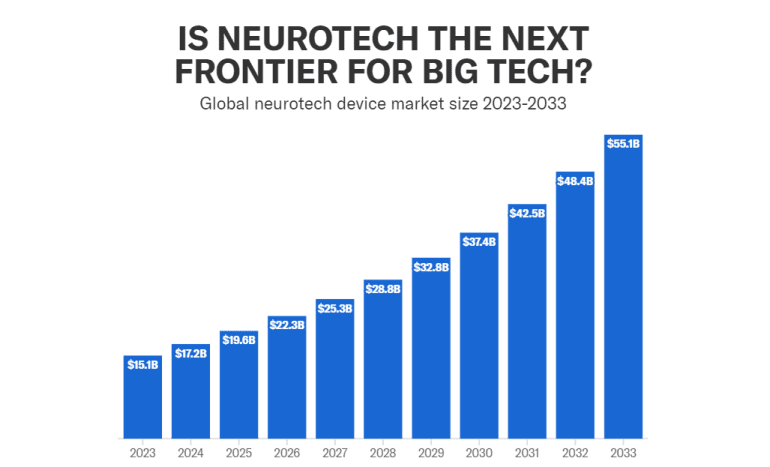- Neurotechnology, powered by AI, revolutionizes healthcare by interpreting brain signals.
- Implantable devices, like Stentrode, enable communication for patients with debilitating diseases.
- Market for neurotech devices projected to soar from $15 billion in 2023 to over $55 billion by 2032.
- Big Tech, including Meta and Apple, invests in non-invasive neurotech research.
- Concerns arise over privacy implications as tech companies delve into mind-reading technology.
- Advocates push for neurorights legislation to safeguard mental privacy.
- Legislative initiatives like Colorado’s bill signal growing recognition of the need to protect mental privacy.
Main AI News:
In the realm of artificial intelligence, neurotechnology emerges as a pivotal frontier, reshaping healthcare with unprecedented possibilities. Over the years, both companies and researchers have delved into implantable devices capable of deciphering brain signals, transforming them into tangible actions or words. While this technology isn’t novel, the integration of artificial intelligence propels its evolution, enabling individuals grappling with debilitating conditions to communicate in manners previously deemed unattainable.
Meet Rodney, a testament to the transformative power of neurotech. Living with ALS, Rodney received a Stentrode implant, a creation of Synchron, a neurotech firm supported by heavyweights like Amazon’s Jeff Bezos and Microsoft’s Bill Gates. Embedded with a minuscule electrode, the device translates brain signals into physical motions, empowering Rodney to type using his thoughts alone.
While Rodney’s story exemplifies the potential of neurotechnology in enhancing lives, the fusion with AI could democratize access to less invasive neurotech for everyday consumers, fostering a new era of consumer-centric tech innovations.
Market analysts at Precedence Research indicate a substantial growth trajectory for neurotech devices, with a valuation of approximately $15 billion in 2023 expected to skyrocket to over $55 billion by 2032. This surge in market value propels tech giants like Meta and Apple to invest heavily in research aimed at decoding thoughts and perceptions without resorting to invasive procedures.
However, as Big Tech spearheads neurotech innovations in the medical domain, concerns regarding the privacy of our most intimate data—our thoughts—loom large. Nita Farahany, a prominent futurist and tech ethicist, warns that this advancement could compromise the final bastion of privacy we possess, highlighting the urgent need for robust regulatory frameworks.
Elon Musk’s Neuralink recently made headlines with the implantation of its first human patient with a brain-computer interface (BCI), underscoring the fervent pursuit of neurotechnology across the tech landscape. Despite encountering initial setbacks, Musk’s endeavor underscores the collective ambition among CEOs to realize the potential of neurotech.
Apple, with its patent for AirPods integrated with EEG technology, and Meta, funding research to decode human language processing, further exemplify the industry’s commitment to neurotech innovation.
Nevertheless, as tech titans vie to unlock the mysteries of the mind, the pressing question persists: what implications arise when Big Tech gains unprecedented access to our thoughts? Neurorights advocates advocate for legislative safeguards to preserve mental privacy in an era defined by burgeoning neurotechnology.
In response to mounting concerns, legislative initiatives such as Colorado’s recent bill expanding privacy rights to include neural rights signal a burgeoning movement towards safeguarding mental privacy.
In the pursuit of technological advancement, it’s imperative to uphold fundamental rights, ensuring that innovations in neurotechnology serve humanity’s best interests while preserving the sanctity of individual privacy. As Rodney eloquently expresses his hope for broader accessibility to transformative neurotech, it’s clear that the path forward demands a delicate balance between progress and privacy.
Conclusion:
The convergence of neurotechnology and artificial intelligence heralds a new era of healthcare innovation. With Big Tech leading the charge, the market for neurotech devices is poised for exponential growth. However, as advancements continue, addressing privacy concerns and implementing robust regulatory frameworks will be paramount to ensuring ethical development and widespread societal benefit.

